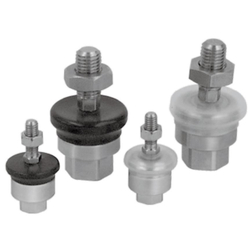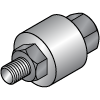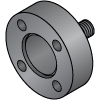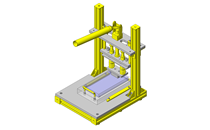(!) Since support from Microsoft will end on January 14 2020, Windows 7 user might not be able to use MISUMI website effectively. Please consider to update your system as ‘MISUMI Website system requirement’.
- Scheduled Maintenance Notice: This site will be unavailable due to scheduled maintenance from 8:00 28/7/2024 to 6:00 29/7/2024. We apologize for the inconvenience.
- Notice of End of Sales for Economy Series Pneumatic Equipment Category. More information.
- แจ้งวันหยุดทำการในเดือน กรกฎาคมและสิงหาคม 2567 | Notice holiday in July and August 2024 > คลิก
SMC Floating Joints(Stud Material:Stainless Steel)
SMC offers products Floating Joints specified by Stud Material Stainless Steel from Automation Components product category. There are a total of 1 items. Search and select detailed specifications of parts for your machine with free CAD downloads. SMC products are available to order through MISUMI online 24 hours a day. Free shipping, no minimum order.
Configure
Specification/Dimensions
-
Connecting Thread Nominal M(mm)
-
Connection Type, Cylinder Side
- Threaded
- Tapped
-
Connection Type, Work Piece Side
-
 Threaded
Threaded -
 Tapped
Tapped -
 Hole
Hole
-
-
Applicable Cylinder
- Air Cylinder
- Hydraulic Cylinders
-
Connecting Thread Nominal P(mm)
- 0.5~0.8
- 1~1.75
- 2~2.5
- 2.5 or more
-
Holder Type
-
 Side Mount
Side Mount -
 Top Mount
Top Mount -
 L-Shaped
L-Shaped
-
-
Flange Shape
- Round Shape
- Square Shape
- Oval Shape
-
Main Body Material
-
Cylinder Connector Details
- Set
- Connector Only
- Holder Single Item
-
Allowable Misalignment U(mm)
-
Allowable Angular Deviation(deg)
-
Metallic Head
-
Stud Material
|
Type
|
|
|---|---|
Brand |
|
Filter By |
|
| CAD |
|
| Days to Ship |
|
- 1 items
- Sort By
-
You can add up to 6 items per a category to the compare list.

 Until 31/03/2025
Until 31/03/2025 Until 31/03/2025
Until 31/03/2025Floating Joint, Stainless Steel Type JS Series
SMC
A stainless steel type floating joint that does not require centering.
[Features]
· A floating joint can absorb any "off-centering" or "loss of parallel accuracy" present between the cylinder and the driven body.
· A high level of machining accuracy is unnecessary. Dramatically reduces installation time.
· Compact and suitable for high tensile stresses.
· Long service life (with dust-proof cover).
· Rotating angle: ±5°.
· Operating pressure: Pneumatic cylinder (1 MPa or less). Hydraulic cylinder (3.5 MPa or less).
· Mounting: Basic type.From: ฿ 1,649.00 Special Price Days to Ship: Same day
Same day
| Brand |
|---|
| Product Series |
| CAD |
| From |
| Days to Ship |
| Type |
| Connecting Thread Nominal M(mm) |
| Connection Type, Cylinder Side |
| Connection Type, Work Piece Side |
| Applicable Cylinder |
| Connecting Thread Nominal P(mm) |
| Holder Type |
| Flange Shape |
| Main Body Material |
| Cylinder Connector Details |
| Allowable Misalignment U(mm) |
| Allowable Angular Deviation(deg) |
| Metallic Head |
| Stud Material |
You can add up to 6 items per a category to the compare list. | |
| Brand | SMC |
| Product Series | |
| CAD |
|
| From | ฿ 1,649.00 Special Price On Sale Until 31/03/2025 |
| Days to Ship | Same day |
| Type | Floating Joints |
| Connecting Thread Nominal M(mm) | M3 ~ M8 ~ M10 ~ M18 |
| Connection Type, Cylinder Side | Tapped |
| Connection Type, Work Piece Side | Threaded |
| Applicable Cylinder | Air Cylinder / Hydraulic Cylinders |
| Connecting Thread Nominal P(mm) | 0.5~0.8 / 1~1.75 |
| Holder Type | - |
| Flange Shape | - |
| Main Body Material | Stainless Steel |
| Cylinder Connector Details | - |
| Allowable Misalignment U(mm) | 0.5 ~ 1 |
| Allowable Angular Deviation(deg) | ±5 |
| Metallic Head | No |
| Stud Material | Stainless Steel |
Loading...
Related Categories to Floating Joints
FAQ Floating Joints
- Question: What are Floating Joints and their primary function?
- Answer: Floating Joints are mechanical components designed to compensate for misalignment between a cylinder rod and the driven workpiece. They absorb both lateral (side-to-side) and angular (rotational) misalignment, ensuring smooth linear motion and preventing damage to connected parts.
- Question: How do Floating Joints improve installation accuracy?
- Answer: Floating Joints significantly reduce the need for precise alignment during installation. Their ability to accommodate misalignment simplifies the process, reducing the need for high-precision machining and alignment of connected components.
- Question: What types of Floating Joints are available?
- Answer: Floating Joints are offered in various configurations to suit different applications:
Quick Connection Type: Facilitates easy and fast installation with a holder.
Tapped Type: Connects directly to components with tapped threads.
Flange Mounting: Mounts via either round or square flanges.
Screw Mount Type: Features various sizes with threaded connections. - Question: What materials are used in Floating Joints?
- Answer: Floating Joints are commonly constructed from brass, stainless steel, or carbon steel. Surfaces are often treated with hard chrome plating or electrophoretic paint to enhance durability and resistance to abrasion and corrosion.
- Question: How do I choose the right Floating Joint for my application?
- Answer: Consider the following factors when selecting a Floating Joint:
Connecting Thread Nominal (M): The size of the thread on both the cylinder side and the workpiece side.
Connection Type: Threaded, tapped, or flange mount.
Applicable Cylinder: Compatibility with air or hydraulic cylinders.
Allowable Misalignment and Angular Deviation: Ensure the joint can handle the expected misalignment in your specific setup. - Question: What are the operational limits of Floating Joints?
- Answer: Temperature Range: Typically -20°C to 70°C (-4°F to 158°F), but can vary depending on materials and surface treatment.
Misalignment Capacity: Varies by type and size. Check specifications for allowable lateral offsets and angular deviation. - Question: What precautions should be taken when using Floating Joints?
- Answer: Avoid Rotary Motion: Floating Joints are designed for linear motion only.
Cushioning Mechanism: Use cylinders with built-in cushioning to prevent impact damage to the joint.
External Stop Structures: Consider external stop cushioning to absorb excessive impact loads and protect equipment. - Question: Can Floating Joints be used in compact or confined spaces?
- Answer: Yes, compact and ultra-short Floating Joint designs are available specifically for use in tight spaces.
- Question: What are the benefits of using Floating Joints in automation systems?
- Answer: Reduced Installation Time: Simplified alignment saves time.
Increased Longevity: Reduced stress on components extends their lifespan.
Versatility: Suitable for a wide array of factory automation applications.






































How can we improve?
How can we improve?